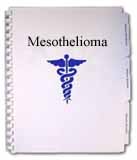|
Mesothelioma and Lung Cancer News - Return to Menu
Custodians file suit against UNLV
By MELISSA ROTHERMEL
February 17, 2005 - John T. Giordano, 54, and Gerald Babcock,63, noticed shortness of breath and a lack of endurance after working as custodians at UNLV.
The men have been diagnosed with asbestosis, an incurable scarring of the lung tissue known to cause shortness of breath and persistent coughing. It can lead to cancer such as mesothelioma, a cancer only caused by asbestos exposure.
Giordano, now retired, filed in November a District Court lawsuit against UNLV alleging the institution knowingly allowed workers to clean asbestos fibers without proper safety equipment or training, according to the Review-Journal. About 40 plaintiffs have now joined the suit, the custodians' attorney told the R-J.
The claim is being settled through UNLV's worker's compensation, said Richard Linstrom, UNLV's general counsel. If it works, he added, the custodians are insured for worker's compensation.
Linstrom was hesitant to remark further, as litigation is ongoing, but he did say he was hopeful that things would work out so the employees would get what they deserve. Dan Schwartz, the attorney in worker's compensation handling the suit, could not be reached.
The custodians came into contact with asbestos, though they did not know it at the time, when they vacuumed dust and picked up debris from buildings which were renovated to house UNLV Paradise campus police officers. They remembered the dust flying in their faces, not realizing the dust particles would leach permanently onto the men's lung tissue.
They also cited in the lawsuit their frequent use of high speed buffers, used to remove the finish from tiles containing asbestos. They included that they had gathered debris and dust from many rooms on campus.
Asbestos, a group of naturally occurring fibers, was used in buildings for fireproofing, soundproofing and insulation. Asbestos is mined, and was frequently added to tiles and textiles before it was discovered to be dangerous. Use of the "do-everything" product peaked in the 1970s.
Giordano and Babcock filed complaints with the Occupational Safety and Health Administration about asbestos at UNLV. OSHA cited UNLV in 2003 for several asbestos violations. Inspectors found loose asbestos in hallways and classrooms and janitorial storage rooms in the FDH building, according to the R-J. An asbestos awareness class at employee orientations resulted, OSHA records state.
UNLV also has a 489-page Asbestos Management Plan with specific instructions on how to deal with asbestos removal or general remodeling in rooms containing asbestos.
Mike Mooneyham, Giordano's supervisor, was also diagnosed with asbestosis. He claimed custodial workers blame communication between management and staff for many UNLV custodians contracting asbestosis. Mooneyham said he was never told about asbestos abatements or where they were.
"I blame a lack of respect for the custodial worker," he told the R-J. He also said communication has improved since the lawsuit was filed.
Almost 30 UNLV buildings contain asbestos, which is benign when left alone. Asbestos particulates get into the air through renovation, such as when bookshelves were unbolted from the floor in the buildings Babcock and Giordano cleaned.
Some of the buildings containing asbestos are the FDH building, the William S. Boyd School of Law, and the Judy Baley Theatre, according to UNLV's facilities, management and planning Web site. Most of the asbestos at UNLV is imbedded in floor tiles.
Watchdog's fine a first for disclosure law
By MARC MONCRIEF REGULATION REPORTER
August 2, 2005 - The securities regulator has for the first time used continuous disclosure provisions and fined a company it claims misrepresented the ability of its product to fight cancer caused by asbestos.
The Australian Securities and Investment Commission fined Perth pharmaceutical company Solbec $33,000 after it found the company failed to disclose details of a study relating to its cancer drug, Coramsine. It is the first time ASIC has used the powers to address relatively minor breaches of the continuous disclosure provisions.
Under the Corporate Law Economic Reform Program (Audit Reform and Corporate Disclosure) Act 2004, ASIC may issue an infringement notice. The recipient can respond, and then ASIC may impose a penalty. .
Solbec's share price nearly doubled after an announcement to the Australian Stock Exchange last November 23 that claimed Coramsine brought about total remission of malignant mesothelioma in mice. Mesothelioma is the cancer caused by exposure to asbestos.
On November 26, Solbec told the exchange that only two of five mice studied had gone into remission.
Solbec paid the penalty on June 14. But yesterday, the company issued an announcement to the ASX in which it denied it had breached its continuous disclosure obligations.
It claimed: "The bulk of the information in the 26 November 2004 announcement was contained in the earlier announcement.
"Given that payment under the notice does not constitute an admission of liability nor an adverse finding against Solbec, the directors have resolved to pay the fine to avoid the possibility of further legal proceedings and associated legal costs."
ASIC executive director of enforcement Jan Redfern said the notice was not a finding of any contravention and agreed that Solbec admitted no wrongdoing.
She said Solbec had voiced its argument, but ASIC had decided it was appropriate to issue the notice.
The $33,000 fine was the highest penalty available for a company of Solbec's size.
"It's a matter for them to say, 'look, we don't agree and here is the reason why' and that is what they've done."
This was the first infringement notice ASIC has issued under the law, but civil penalties available under the laws were tested for the first time last year against Perth-based biotech company Chemeq.
|

































